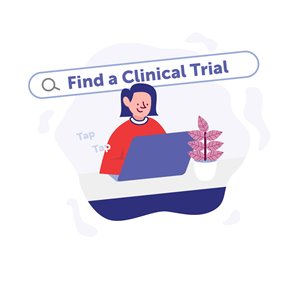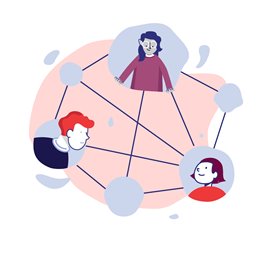Receiving a confirmed diagnosis of a rare genetic disorder for you or your child can feel absolutely overwhelming. There is information and resources below to take some first steps. In some instances, obtaining available treatment early can result in better outcomes.
Discussing Options
A good first step is to meet with a medical geneticist or genetic counselor to learn more about the disease, its prognosis, and what potential treatment options and supportive measures may exist. Unfortunately, some rare genetic diseases may have few or no treatment options. There may also be investigational treatments, such as gene and cell therapies, available through clinical trials. Gene therapy has the potential to treat a variety of genetic diseases, but it is just beginning t o receive FDA approvals to be commercially available.
o receive FDA approvals to be commercially available.
It's possible that a primary care provider may have limited knowledge of rare genetic diseases, so it may be valuable to speak with a health professional that is a specialist for the disease and a genetic counselor to help you understand the diagnosis and cope with the resulting emotions. Your primary care provider can potentially recommend a specialist, such as a hematologist, oncologist, movement disorders specialist, or neurologist depending on the disease. Connecting with other families may be another way to identify specialists with experience specific to your rare disease. (See the Community and Resources section)
Gene Therapy as Treatment
Gene therapy may offer hope in treating or slowing the effects of some genetic disorders. Gene therapy treats the cause of a genetic disorder, which is a change (mutation) of one or more genes. This is done by introducing new genetic material into cells to change how they operate. For example, gene therapy could deliver a gene that instructs a cell to produce a missing protein or enzyme. This general concept can be applied to treating a variety of genetic disorders. However, each disorder has variables that need to be addressed in the development of each treatment. For example, genetic disorders like sickle cell anemia result from mutations in a single gene (monogenic). This makes the task of delivering a corrected gene into a cell less complex than if the disease was caused by a combination of genetic and environmental factors, like heart disease or cancer.

There are only a few FDA-approved gene therapies currently available, but hundreds are being studied in clinical trials. Clinical trials are necessary phases of research that establish safety and effectiveness of treatments before being approved by the U.S. Food and Drug Administration for commercial use. Trials offer an opportunity to receive an investigational treatment, while also supporting progress in scientific research that may help others with the disease in the future. Finding a treatment and/or considering clinical trial participation—and determining eligibility—are additional steps on a patient’s journey.
Resources for Research
After discussing treatment options with your provider, consider seeking additional information from reliable sources. There are a variety of helpful resources available that share information on active clinical trials and advances in treatment for genetic disorders.
The Genetic and Rare Diseases Information Center (GARD), a program of the National Center for Advancing Translational Sciences (NCATS), provides the public with access to current, reliable, and easy-to-understand information about rare or genetic diseases in English or Spanish.
Here are some other resources:
- Global Genes has a RARE List with information on nearly 6,000 rare diseases.
- The NIH Genetics and Rare Disease Information Center maintains a list of rare diseases and information about them, along with organizations that relate to that disease that could assist in finding a specialist.
- The National Organization for Rare Disorders (NORD) has a Rare Disease Database with disease-specific reports that provide a listing of organizations that can be a link to medical specialists and support groups for that disease.
- Participate in NORD's Living Rare Study, the first ever large-scale study in the U.S. examining how the experiences and challenges of people impacted by rare disease change over time.
PubMed is an online database that can be a resource to find the latest medical research from leading experts in the field. It contains scientific journal articles, which can be highly technical. However, peer reviewed articles listed in PubMed are a trustworthy source to identify the most recent advances in research. Sometimes you may find that the information you are seeking is behind a paywall. In that case, one option is to contact that researcher directly using the provided contact information, and they may send you the article. NIH Genetics and Rare Disease Information Center has more helpful resources to help you dive into clinical research on rare diseases. Here are some Tips to begin your search:
- Start by using the name of the condition
- Use words that describe the condition (e.g., neuromuscular, or lysosomal storage disorder)
- Use words you see when reading about your condition
- Search for a type of treatment (e.g., gene therapy for hemophilia)
 To be informed on investigational treatments that may be in clinical development for a particular disease you can search for clinical trials. To stay up to date on active and recruiting clinical trials that may become available in the U.S. or globally, visit ClinicalTrials.gov or the Gene Therapy Trial Browser.
To be informed on investigational treatments that may be in clinical development for a particular disease you can search for clinical trials. To stay up to date on active and recruiting clinical trials that may become available in the U.S. or globally, visit ClinicalTrials.gov or the Gene Therapy Trial Browser.
If you research clinical trials from other sources, be sure to pay attention to the details provided. For instance, inclusion and exclusion criteria are factors that could make you eligible or ineligible for the trial and may include a specific diagnosis, age group, disease severity, and previous treatments or surgeries. These criteria are an important way for researchers to increase the chances of producing reliable results and to enhance participant safety. Additional medical treatments may be required for a gene therapy to be effective. For example, sometimes chemotherapy is administered before an ex vivo gene therapy treatment, as it eliminates existing cells that may be carrying the faulty gene.
The Power of Patient Registries
Another proactive step you can take following a confirmed diagnosis is to join a patient registry. Patient registries are used to collect and store information about people’s experiences living with a particular disease or condition. The registry may be used to recruit patients for clinical trials, develop therapeutics, monitor the quality of care and collect natural history study data. A natural history study follows a group of people over time who either have, or are at risk of developing, a specific disease. Certain patient registries will allow you to put yourself on the radar for clinical trials and to provide researchers with information that can potentially lead to medical advances.
The National Organization for Rare Disorders (NORD) Registry Program, The Coordination of Rare Diseases at Sanford (CoRDS) and the Rare Diseases Registry Program (RaDaR) are all great examples of centralized patient registries for rare diseases, with the goal of promoting and supporting patient-focused research. Many patient foundations also establish patient registries to help bring together a specific disease community and as a resource for researchers.
Community and Resources
 Being diagnosed with a rare disease can feel overwhelming, but remember that you and your family are not alone, and there are resources to help. Getting involved with patient organizations is a great way to connect with other families and people affected by a disease. There are many groups already established, both small and large, focusing on very specific diseases and equipped with helpful experiences and expertise. These organizations can provide resources, guidance and advocate for treatment research. Organizations engage with people through in-person events, social media and emails. By contacting a patient foundation, or organization, you can get information and also obtain support from other patients and their families.
Being diagnosed with a rare disease can feel overwhelming, but remember that you and your family are not alone, and there are resources to help. Getting involved with patient organizations is a great way to connect with other families and people affected by a disease. There are many groups already established, both small and large, focusing on very specific diseases and equipped with helpful experiences and expertise. These organizations can provide resources, guidance and advocate for treatment research. Organizations engage with people through in-person events, social media and emails. By contacting a patient foundation, or organization, you can get information and also obtain support from other patients and their families.
You may consider following one of the key organizations listed below who are working to support rare disease by providing networking and advocacy opportunities, featuring a range of topics in their educational resource libraries, and keeping you up to date with awareness initiatives, and relevant news.